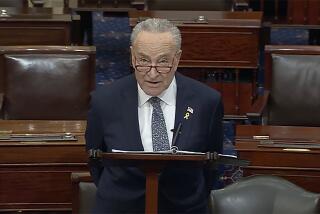U.S. walks the line on Egypt
A little more than two months ago, when Hosni Mubarak’s government rigged Egypt’s most recent parliamentary elections, the Obama administration issued a notably mild statement expressing “dismay.” That reaction wasn’t nearly strong enough for Mohammed ElBaradei, Egypt’s leading opposition figure and the man who may lead the country’s next government. “I was dismayed,” he wrote, “that all [the administration] could say is that it was dismayed.”
But the U.S. has attempted a difficult balancing act for decades where Egypt is concerned. And though it’s easy to criticize President Obama for not condemning undemocratic elections or rushing to embrace the demonstrators in Tahrir Square, his hesitation in both instances was understandable, even if it wasn’t admirable.
In Egypt and elsewhere, the United States has tried to promote democracy and preserve stability at the same time, but when the two goals conflict — as they often do, at least in the short run — Washington has usually opted for stability first.
Even now, with Egypt in tumult, the Obama administration is trying to preserve whatever stability it can. The premier U.S. ally in the Middle East, Israel, is frantic at the prospect of an Egypt ruled by populists or Islamists who might turn hostile after three decades of peace. There is also the question of what message U.S. support for the demonstrators would send to its other allies in the region, most of which aren’t shining examples of democracy. Kings in Saudi Arabia and Jordan, military strongmen in Yemen and Algeria want to know whether they are next, and whether their alliances with Washington will mean anything in the crunch.
“This is going to be very tricky,” said Scott Carpenter, who worked on democracy promotion in the George W. Bush administration. “It’s going to be important to communicate what we did and why, so other regimes can understand our thought process. Some of them are already saying that Obama stuck a knife in Mubarak’s back; that the United States doesn’t know how to protect its friends. If it’s not framed properly, this episode could send a message that the United States is weak.”
Given all those conflicting interests, the wonder isn’t that it took Obama so long to put himself on the side of the demonstrators but that he was able to pivot as fast as he did.
A little more than a week ago, the Obama administration was still praising Mubarak’s rule as stable. By the end of last week, it was asking for “reform”; by Sunday, “an orderly transition”; and by Tuesday, a transition that “must begin now.”
What happened?
Three things. First, Egypt’s demonstrators stood their ground against Mubarak’s security police and embraced soldiers in the streets, which revealed that the regime no longer had the option of ending the protests with force. Second, Egypt’s military command — the real source of power in Cairo — reacted to that by pressing Mubarak to appoint a vice president, a move he had refused for 30 years because it acknowledged the need for a successor. And third, after a few days of hesitation, the administration realized — in the words of a former official consulted by the White House — that “we cannot keep our finger in the dike.... There was an opportunity here, and we might be missing it.”
In fact, the administration is still pursuing stability in Egypt rather than democracy at any cost. It has allied itself directly with the Egyptian military, not with ElBaradei or anyone else in the opposition. It’s still aiming for an essentially conservative goal, an “orderly transition” to democracy overseen by the armed forces, which want to keep their privileges — and have no appetite for war with Israel, U.S. officials believe.
“We would hope to see it come out of this process a stronger, democratic [country], continuing to be a secular nation … trying to bring peace to the region,” Obama’s new chief of staff, William M. Daley, told reporters Wednesday.
But the U.S. can’t ensure that Egypt’s revolution will turn out that way. There aren’t many examples of peaceful transitions to democracy when U.S.-backed autocrats are overthrown — and most of them are in Asia, where it took decades of evolution for the Philippines, South Korea and Taiwan to become democratic.
Egypt’s next government, unlike its armed forces, is unlikely to feel any real debt to the Obama administration. It’s likely to be more populist, which means both anti-Israel and at least mildly pro-Islamic. As the administration has already conceded, it may well include the Muslim Brotherhood, Egypt’s main Islamist opposition group, which makes Israel understandably nervous.
If things go well, the Obama administration isn’t likely to get much credit. But if things go poorly, the question will inevitably be raised: Who lost Egypt?
The Obama administration’s answer will be Hosni Mubarak. An 82-year-old dictator should have done more succession planning than setting up his unpopular investment-banker son to inherit the seat.
Could the United States have prevented Mubarak’s fall? Only if it had persuaded him to launch reforms years ago — and every president since Ronald Reagan (whose ambassador in Cairo pushed for naming a vice president) failed at that pursuit.
Those who argue that Obama should have stood athwart the tide of Egyptian history and shouted “stop” might consider how difficult it has been for the United States to shape the futures of Lebanon, Iraq or Afghanistan.
So it’s fitting that the Obama administration is spending so much time being modest about its power to determine Egypt’s future. It may be a useful argument, in that it shields the United States from bearing full responsibility for the outcome. But as Henry A. Kissinger used to say, it has the added advantage of being true.
More to Read
A cure for the common opinion
Get thought-provoking perspectives with our weekly newsletter.
You may occasionally receive promotional content from the Los Angeles Times.







